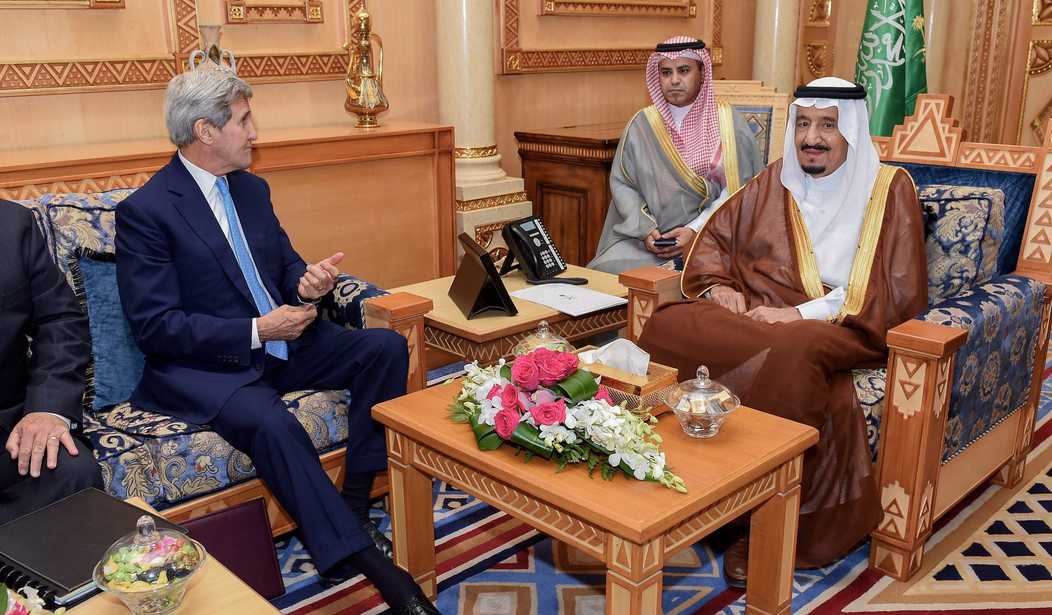Both Israeli TV and the Middle East Media Research Institute (MEMRI) are reporting on a new development in Saudi media. MEMRI calls it “a number of highly unusual articles harshly critical of the antisemitic discourse in Arab and Muslim society.” The well-respected institute says the trend “is no coincidence, and is likely meant to lay the groundwork for public acceptance in the country of normalized relations with Israel.”
It was three weeks ago that a Saudi delegation led by Dr. Anwar Eshki, a retired general and former top adviser to the Saudi government, made an unprecedented visit to Israel. Although the visit evoked sharp condemnation from some quarters in Saudi Arabia and the Arab world, MEMRI—not known for soft sentimentalism—sees something big in the works.
Among the articles MEMRI quotes from the Saudi media, a Saudi columnist, Siham al-Qahtani,
argued that Koranic descriptions of Jews—as killers of prophets, infidels, warmongers, and usurers—apply to a particular group that lived during a specific time period, and that the traditional view that blames disasters throughout history on Jewish plots stems from the helplessness of Arabs, who searched for scapegoats on whom to blame their own failures.
Although Al-Qahtani wrote that she believes in “a Jewish plot against Arabs,” she also said it could never have worked without Arab ignorance: “The chief enemy of Arabs is Arabs [themselves].”
Another columnist, Yasser Hijazi, “penned two articles calling to abandon hatred of and hostility towards Jews in Arab…discourse.” Hijazi wrote:
Since my childhood, I—like other Arab children—was raised on hatred of and hostility towards Jews…. Religious education has been persistent in its racism and hatred…. Who [among us] demands to end Judeophobia…? Who openly demands to treat the Jews like all other people…? This will be a step on the path to coexistence with the world.
And the writer Ibrahim al-Matroudi called for overcoming enmity toward Jews and, instead, learning from them:
Hatred blinds and unbalances the individual…. [The Jewish nation] was isolated and distanced from life, but…has remained alive and alert, and has continued to build its future, and its sons have reached the top of the pyramid in science, philosophy, and economics…. Our current situation will persist until a generation arises that acts like the other nations and benefits from the experience of others, rather than shies away from it; a generation where religion and faith do not prevent you from mingling with others and believing in them, and thinking positively about their ideas, visions, and theories; a generation that competes with other nations in their chief industry—the industry of life.
Those words are striking and get the Arab predicament exactly right.
Yet according to another observer, Israeli Arab journalist Khaled Abu Toameh, it is hardly time to celebrate. Abu Toameh continues to discount any possibility of Arab rapprochement with Israel.
Noting that many Arabs and Muslims “are up in arms” over the Saudi delegation’s visit to Israel, Abu Toameh asserts:
The existence of Israel on “Muslim-owned” land…is the real problem….
In Islam, if land has ever been under Muslim control…it must belong to Muslims…as an endowment, or waqf, held in trust for Allah, in perpetuity. As the entire Middle East was under the control of the Muslim Ottoman Empire from 1259-1924, many Arabs and Muslims believe that the entire area belongs only to Islam, regardless of who may have lived there before.
Jews, who have lived continuously in Biblical Canaan and Judea for three thousand years, might well wonder how they can be accused of “occupying” their own land.
But, of course, they are, and Abu Toameh cites Saudi commentators who have reacted differently to the apparent Israeli-Saudi thaw than those quoted by MEMRI. One of them wrote: “Israel will remain our number one enemy”; another: “Anyone who calls for peace with the Zionists should be brought to trial for high treason. Normalization is treason.”
Abu Toameh concludes somberly:
The facts on the ground show that the Arab and Muslim masses continue to see Israel as an alien body that was forcibly planted on “Muslim-owned” land. For the masses, jihad against Israel is the solution, not another peace initiative endorsed by unelected Arab dictatorships.
A situation where observers as knowledgeable and astute as MEMRI on one side, and Khaled Abu Toameh on the other, appear to disagree sharply is an interesting one. Of course, the Israeli-Saudi warming of ties is generally, and rightly, attributed not to a sudden infatuation on the Saudis’ part but to an acknowledgment of common interests—particularly the need to cooperate against the Iranian threat.
And when MEMRI writes of “lay[ing] the groundwork for public acceptance in [Saudi Arabia] of normalized relations with Israel,” “normalized relations” could refer to a situation between governments. Israel’s peace treaties with Egypt and Jordan, for instance, have endured, but have only been grudgingly tolerated by those countries’ populations, which remain rife with antisemitic and anti-Israel sentiments.
One thing, though, is clear: the Arab countries’ inability to excel, as Israel has excelled, is integrally linked to the ongoing role of hatred and intolerance in those countries. Meanwhile the Arabs need Israel more and more—for security cooperation, water, energy, agricultural expertise, and so on. Can rationality set in?








Join the conversation as a VIP Member